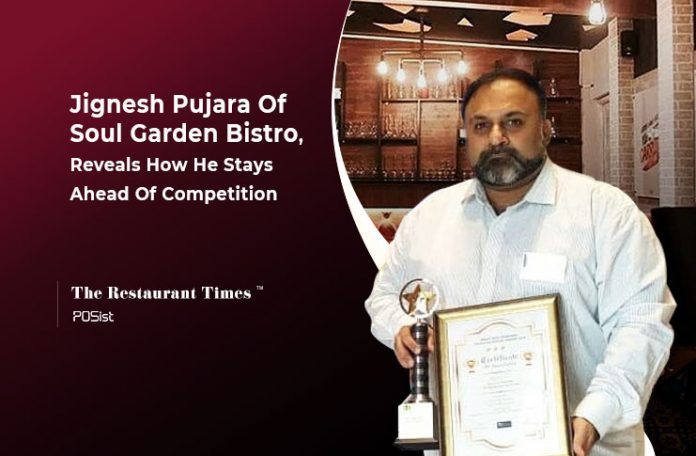The man behind this popular venture is Jignesh Pujara. As an enthusiast of food, he chose to pursue his passion and set out to Australia to start a café but couldn’t go ahead with his plans due to the economic recession at that time. He hailed from a family which had it own iron and still a business. Their expectations didn’t stop him from pursuing his passion and he went on to start a frozen yoghurt franchise in the US which started with a bang. Unfortunately, it had to be closed down later due to high rentals and low demand. However, it was way ahead for its time Undeterred, he picked up the pieces and started from scratch to build a new brand, “Soul Garden Bistro”, which was a dream come true for Jignesh who has excellent support from his senior chefs and other colleagues- all young minds keen on exploring new food concepts and bringing them to life at the restaurant.
In Conversation With Jignesh Pujara of Soul Garden Bistro
In an exclusive conversation with The Restaurant Times, Jignesh Pujara talks of his journey in the industry, the story behind Soul Garden Bistro, operational challenges in running the business and a lot more.
The Story Behind Soul Garden Bistro
Soul Garden Bistro commenced operations in the year 2016, the young and vibrant restaurant continues to surprise its customers with its unique and innovative food concepts. It’s been so popular in Alwarpet that it has now opened its second outlet in Kilpauk. It ensures a serene and enriching dining experience for its guests.
Soul Garden Bistro is a full-fledged vegetarian multi-cuisine restaurant serving a wide range of pizzas, pasta, burgers, sandwiches, sizzlers, parathas, Mexican, Asian and continental dishes. The ice creams from its sister brand “196 Degrees Below Dessert Lab” complement their expansive menu. The concept is unique, serving instant ice creams prepared using liquid nitrogen in the presence of the guest and sends down a smooth and silky texture in the mouth and touches one’s heart.
It offers over 50 different flavours to choose from, free of any additives or preservatives. A discrete and uber-cool feature of the ‘dessert lab’ is its glassware which looks similar to the equipment of a chemistry lab. Therefore, your ice cream is served in a beaker, the mojitos and lemonade in conical flasks and freak shake in skull-shaped glasses.
Malaysia’s signature pastry Mexican Coffee Buns filled with butter and a thin coffee crust offered at “ANTARI”, their recent brand also serves biodynamically grown coffees sourced from self-sustaining farms. They use A2 milk and sulphur less sugar for their coffees and teas.
Soul garden bistro has many healthy concepts included in their menu like keto for guests who prefer to have low carbs, vegan and Jain options, the activated charcoal in buns and ice creams, gluten-free, whole wheat bread etc. The big news is that pet lovers can dine in with their pets at Soul Garden Bistro!
Operational Challenges While Running The Restaurant Business In Chennai
Chennai is a vibrant community and has always been a trendsetter for brands across all platforms. Pujara says that though Chennai is a tough market, as the popular saying goes, once you win over Chennai, you have won over India.
All restaurateurs face many of the same challenges. Some of the challenges which Pujara talks about are:
- Operational Costs:
Restaurants need sufficient cash flow to manage daily operations which include food and labour. It is a challenge to generate enough cash flow to meet your expenditure. Food cost is one of the biggest operating expenses in running a restaurant. One can implement sales forecasting, goal setting, menu engineering, employee training, employee meal policies, theft prevention, and advanced inventory management to keep food cost in check.
- Unforeseen Circumstances:
Pujara mentions that Chennai has seen many ups and downs with floods, cyclone, unfortunate political events, water scarcity and the like. It poses a challenge for the restaurant industry. However, such kind of risk is unavoidable. All these events lead to shutting down of the outlet for a long time and there is also, loss of property at times. - Retaining Staff and Customers:
In the restaurant industry, the turnover problem is also extremely costly. According to Pujara, retaining the staff as well as customers is another challenge. For retaining staff, one must employ new and innovative hiring practices and perks such as giving the staff incentives. To build long term customer loyalty, restaurateurs must innovate their menu and offer quality food.
Enhancing Customer Experience with LYFE
Pujara says that given the evolving trends and the needs of their customers, it only made sense for them to bring a new concept of operations to Soul Garden Bistro. This led to the launch of LYFE by Soul Garden Bistro which opened its doors at the Newly launched Palladium Food Court Velachery.
For thousands of years, when people became ill, they had no medicine as such to rely on. If they were to get better, they had to do so only by using the food that they ate. Moving forward to the present day, many doctors and healthcare practitioners are now taking a more holistic approach to illness, as much emphasis is now put on diet and nutrition.
If we l eat consciously and choose the foods that can stimulate our mind as well as soul, we can overcome the stresses and strains of modern living in a simple and delicious way. It might not be a cure, but it can be a start to a new life. This was the guiding principle behind the new concept.
Eating healthy isn’t easy, but we believe it should be, and that’s why we started LYFE, says Jignesh. A transition that was long overdue after testing the waters with Soul Garden Bistro and our sister brands, the question was how best to focus on making food healthy, tasty and uncomplicated. That’s when LYFE was born so that their customers can focus on eating well and living well.
At LYFE, they strive to serve food that is honest, tasty, clean, well-sourced and wholesome, in adherence with the #eatrightindia movement. At LYFE, extra care is taken to select the freshest ingredients available to craft their food hygienically without adding any artificial flavors, preservatives, colors or additives. The food is cooked in cast iron utensils, using only cold-pressed oil and olive oil, to give the customers peace of mind when they dine at LYFE.
At LYFE, every aspect of the food is meticulously taken care of. It’s just not about clean or healthy eating anymore. It’s also about choosing the best ingredients and being transparent about it. It influences the way in which food is cooked, served, and packed. It is also reflected in the way the food waste is segregated, disposed or decomposed.
For better customer experience, they source the best ingredients locally and from around the world right from hydroponic greens, organic cheese, organic chocolates, french breads, A2 Milk, organic sulphurless khandasari sugar to dish out the the best vegan soups, exotic salads and bowls, artisan sourdough pizzas and pastas made from Durum Wheat (no Maida) , handcrafted gelatos using A2 milk , organic sugar, and organic chocolates.
Staying Ahead Of Competition and Strategic Learnings
The F&B industry is one of the most competitive industries to survive and make a mark in. The pricing, service, quality of food, and location are some of the principal factors that affect a restaurant’s standing in terms of the number of footfalls it gets, the economies of scale it generates, and the revenue it makes.
According to Pujara, to make a mark in the F&B industry, it is better to stick to originality. Restaurateurs must avoid copying menu concept from competitor’s brands. It is not always necessary that something which worked for the competitor would work for you.
The big problem with “food plagiarism” is that dishes are being copied at a speed never seen before. During menu engineering, taking inspiration from their peers should be encouraged. However, it is important to add one’s own unique element to any recipe rather than blatantly replicating it. It is better to evolve your own own customised menu to attract customers.
Pujara concludes by saying that his three strategic lessons learned in terms of running a successful restaurant have been a passion, patience and perseverance!



















